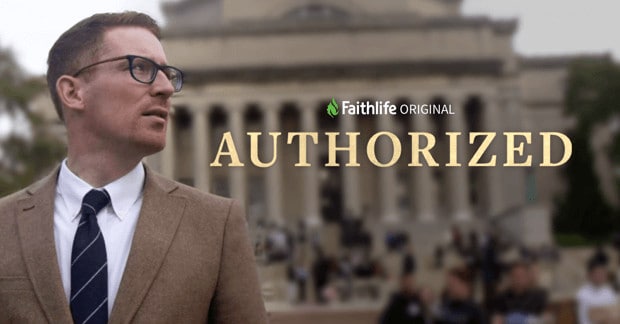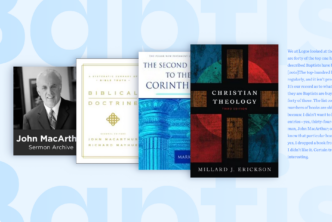Mark Ward is the author of Authorized and recently wrote and appeared in a documentary of the same name. In this interview, we learn about the origins of the film, what went into writing the screenplay, and what audience reactions have been to his arguments about KJV readability.
Why this book and this documentary? I know you’re not in this to get people to stop reading the KJV. What motivated the work?
I’m in it for love. I would pay to do all this work if my Domestic Budget Director supported the idea. I love God’s Word, and I love God’s people. At least since I uttered William Tyndale’s stirring words in a high school play—“Ere many years I shall cause that the boy that driveth the plough shall know more of the Scriptures than thou dost!”—I have felt a strong desire not only to understand the Bible but to help others understand it.
I delivered that Tyndale line in a church that was KJV-Only. We all happily celebrated Tyndale’s legacy without seeing any contradiction between his love for the plow boy and our insistence on (exclusively) using a Bible translated in Elizabethan English.
I later came to see contradictions there; but my good experiences in (and abiding friendships from) that KJV-Only Christian high school are a reminder to me not to crusade or grandstand. My teachers loved me and taught me to love God’s Word. It really isn’t true—and I did take pains to make this clear in the book and the documentary—to say that the KJV is as unintelligible now as the Latin Vulgate was in Tyndale’s day. If the only English Bible we had were the KJV, I would read it and preach it gratefully.
But through years of reading contemporary translations alongside the KJV, I began to see ways in which I had misunderstood the KJV—through no fault of my own, nor of the KJV translators, but simply due to the inevitable process of language change. There are not only “dead words” in the KJV, words we know we don’t know, but there are there are also “false friends,” words we don’t know we don’t know. These are, naturally, significant problems for contemporary readers.
We now have many Bibles in contemporary English, and I’m jealous for other readers to find in them the wealth I’ve mined. I don’t expect anyone to stop reading the KJV; I haven’t. I just want them to add to it—and, especially in institutional settings (churches, schools, camps), to cease insisting on its exclusive use.
What’s at stake in the debate over the KJV?
The main thing at stake is the biblical and Reformation principle of “vernacular translation,” having the Bible in our language. This is a value I believe we have to protect. The longer exclusive KJV users wait to change, the further English will move from the Elizabethan English of the KJV, and the closer my KJV-Only brothers and sisters will get to having a new Vulgate. Saying the KJV is a Vulgate is grandstanding; saying it will be, and that here and there it already is, is merely trying to protect the scriptural value of vernacular translation. If because of my work I hear a significant number of KJV-Only brothers and sisters acknowledging that “dead words and false friends” are a significant problem that will eventually require change, even if they don’t think it’s as big a problem as I do, I will be pleased.
How have KJV-Only brothers and sisters responded to your book and the documentary?
I have had many, many interesting conversations. I literally received an email from the vice president of a strongly KJV-Only Bible college while I was typing this paragraph. We’ve had a long and respectful dialogue.
Six months after the release of my book I summarized the responses I’d received so far. Now that I’m a year in, I think I can generalize even more. Those responses have come on a bell curve.
- On one side of the bell, a small number of people have reacted with anger and accusations—with crusading and grandstanding. And one-star reviews ending with imprecations! I’ve been called disingenuous and a liar. Someone put my face on the body of a weasel and posted it on Facebook (I’m not making this up, but I’m also not sharing the evidence!). I feel sorrow for these brothers and sisters. I pray their behavior is an exception in otherwise faithful lives.
- On the other side of the bell, a small number of the elite, the most highly educated people in the KJV-Only world, have read my book (in many cases because I sent them a copy) and, sadly, refused to engage its arguments. Instead, they have tried to change the subject from English readability to textual criticism. This has happened repeatedly. This has been a genuine disappointment because I was thirsting for critical engagement!
- The biggest response, the bell itself, has been the main joy of this year. I have received not agreement or disagreement so much as something I didn’t know to expect: graciousness. I worked and prayed hard to write graciously (my wife helped!). And I have really seen people in the KJV-Only world respond in kind. One pastor in that world gave me a $50 gift card, even though he disagreed with the book’s conclusion, simply because he was grateful for my tone. He gave me another $50 when my documentary came out! I know there are many people in KJV-Only circles who love the Lord and serve him faithfully; God’s Spirit fills them. They recognize love when they see it. And I have heard from many people in the KJV-Only world, particularly pastors, who told me my book was very helpful for them. Based on the dozens of Facebook friend requests I’ve received from pastors who clearly come from KJV-Only circles, I think a big number of 45(?)-and-under pastors in those circles are feeling restive about the “Onlyism” they’ve been taught. They see in my book and documentary an opportunity to help their people read the Bible better without having to change their minds about the confusing and difficult subject of textual criticism, on which my book is neutral. This was precisely my goal, and I am grateful to the Lord for what he’s done through my work. Indeed, why should I mind if pastors use the NKJV as their pulpit Bible instead of the ESV, NIV, NASB, or CSB? The textual and other differences are insignificant. I simply want them to use a Bible translation made into contemporary English—following what I believe to be the teaching and example of the New Testament.
Bring us into the screenwriting process. How did you develop the script? Did the change in format help you see the subject in a new light?
I wrote as I often do, in manic fits, and often on the bus. This was a side project, and I had to keep my main work going at the same time.
As I began to write, the director, Reuben Evans, offered me some penetrating insights about what a visual medium demands. In particular, we talked a good deal about making sure there was a narrative arc: the Authorized film is a personal journey. I move in the documentary from being “dead-set on keeping my King James Bible, black leather edition,” to—well, you’ll have to watch to find out! Seeing the story as a personal narrative really did help me view the subject in a new light. Changing people’s minds is hard, and I’m no exception. Stories have a way of pulling you in, even if you disagree.
When Reuben, our producer Brian, and I had a read-through of the final script one day to check timings, and when we had to keep stopping the time in order to laugh, I started to feel like maybe the script wasn’t too bad. Tons of people who have read the book and/or seen the film have seemed pleasantly surprised that language nerds can use humor. The only thing better than hearing that someone was edified and instructed through my work is hearing, “I laughed out loud.”
I particularly enjoyed critiquing the Flesch-Kincaid reading-level analysis in a way paper and ink just can’t do. That was true language nerd fun. And for the first time in my life, my various accents served a genuine ministry purpose!
What do you hope people take away from the documentary?
Let me tell you what I hope they do forget: that loud suit from the game show scenes. I wish I had never taken it out of storage . . .
I hope viewers take away two concepts and one personal mission: I hope they learn to distinguish “dead words” and “false friends,” and I hope they purpose in their hearts to take advantage of the gifts God has given to the Church in our embarrassment of English Bible translation riches.
I also hope they check out some of the other cool stuff our family has enjoyed on Faithlife TV. We like Torchlighters a lot. And check out a hidden gem: The Printing. In it, my excellent college Spanish teacher (a fan of my book!) is a sadistic Soviet doctor persecuting my grad school Church history professor, a pastor in the underground Russian Church.
Can you take a moment to respond to any criticism you’ve received over your book and/or this documentary?
In complete honesty, I haven’t run across any criticisms of the book that I didn’t already answer in the book. I have a whole chapter answering ten expected objections; my expectations turned out to be accurate.
But I did just receive my first truly academic review; it has been sent to an academic journal. The writer, who has a bona fide PhD, is not “KJV-Only”—but he does rather love the KJV! I just had to chuckle when I saw his review because he managed to say nothing positive about the book. I mean, my mom liked it—it can’t be that bad. I still side, tentatively, with my mom.
I had really hoped that someone with the reviewer’s chops would give me a patient, careful critique. (I did get a little of that from one of his friends.) But not only did this scholar dismiss my arguments about English readability—and then change the subject to textual criticism; he actually said, “Never has it been easier to read the KJV than now.” Because of smartphone dictionaries, he said, I had no room to complain about the current usefulness of KJV English in a Bible translation.
Now, perhaps my language-change smoke alarm is too sensitive; perhaps it has gone off too soon. I do insist that good Christians can differ over when the readability difficulties of the KJV ought to bring change to churches, publishing houses, Scripture memory programs, signage, and the many other public places where the KJV is still used. But when, after a year, the most accredited critic of my work sees utterly no value in it, I feel strangely comforted. If he had been more measured, if he had tried to find a middle in which to meet me, I might have been forced to do some difficult reconsidering. But I’m willing to appeal to the straight face test: he just cannot be right. Smartphones do not solve the readability problems I detailed in my book and film. I have simply had too many experiences in which I and others innocently misunderstood the archaic English of the KJV to say that Steve Jobs is the answer. Funny experiences, sad ones, serious ones. I just want to understand the Bible.
This critic was on one of the extremes of the bell curve. But I have heard from people in the middle who truly listened and offered thoughtful rejoinders. The weightiest objection I ever get—and I tried to answer it fairly in the book—is that I have overstated the KJV readability problem. I see room for disagreement here, the weighing of genuine but competing values such as stability vs. perspicuity. But to this day, no one has explained to me how people are supposed to look up “false friends” when they don’t realize they’re misunderstanding them. I think this is Authorized’s lasting contribution to the KJV debate.
Concluding thoughts?
I dearly love the KJV-Only people whom God gave to me as teachers in high school. I think they have strengths—particularly of backbone and of personal holiness—that the rest of the body of Christ could benefit from. And I’m not the only one who thinks this way. I simply want these brothers and sisters to enjoy the good gifts God has given to other true Christians, specifically those Christians who have given us our many good English Bible translations.





